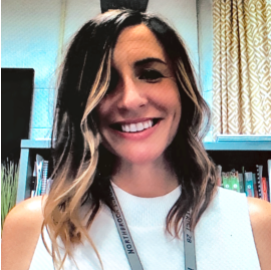Educator Spotlight: Danielle Rubel
Meet Danielle Rubel
What grades do you teach and/or what is your title/role? What school, district or institution do you work for? What location?
I work as an instructional facilitator (coach) at Westmoor School in Northbrook, IL. In my role, I work with staff and students in kindergarten through fifth grade. Prior to becoming an instructional coach, I was a reading specialist and classroom teacher. Currently, I also work with TNTP, a national nonprofit organization, as a math and ELA assignment rater.
Who inspired you to become an educator?
I didn’t take the typical path to become an educator. In fact, I didn’t realize I wanted to become a teacher until my senior year of college. It was then that I realized that a career in the field I was preparing for wasn’t going to fill my bucket in the ways I had hoped it would. At this crossroads of not knowing what was next for me, I thought about my mom, who was a teaching assistant. For years, I watched how hard she worked and how much she poured into her job. And while there were times she was frustrated with her job, she loved it anyway. Because of her, I started to explore the idea of becoming a teacher and have never looked back.
What motivates you?
Collaboration. I’m a big believer in the idea that “more brains are better than one.” I learn so much from my colleagues through collaboration. Not only do we all get smarter through collaborating, but also we build relationships and a culture of support and care in our building.
What advice would you give to your first-year teacher self?
Take a breath! In my first year of teaching, I worked tirelessly around the clock. And because I was working harder, not smarter, I ended that year feeling pretty depleted and defeated. Taking a moment to take a breath and reflect on my instruction and my students’ needs, would have given me a better understanding of where I needed to go and what I needed to do in order to ensure my students were growing.
What do you wish more people knew about being an educator?
We don’t stop thinking about our students when we leave the building. We carry them with us (along with all of the other teacher-related things like planning, prepping, and so on) wherever we go. A big part of our work is building relationships with our students and that means we get to know them really well.
What do you love most about Bridges curriculum/math apps/MLC?
There are two things that stand out for me when thinking about Bridges/MLC that I love most. First, I love (LOVE) the discourse among students in Bridges. Students are not only talking more about math and the strategies they used, but they are also doing so in ways that push their thinking and often result in deeper understanding. The second is the regular use of manipulatives. There’s this misconception out there that math manipulatives are only for primary students or students in upper grades who struggle. Bridges embeds the use of manipulatives for all students and really hits hard on their use as a way for students to create concrete models of abstract concepts.
What do you love most about working with students?
The students are why I’m in education. I love when their thinking unfolds and they come to an understanding. I love how proud kids feel when they accomplish something and how creative they can be. I don’t know if I can pinpoint exactly what I love most about working with students, but working with them makes my heart happy.
What’s your math story? In other words, how do you feel about math and why?
My math story starts way back in third grade when timed multiplication tests were the reason I tried to convince my parents I was sick every Thursday and unable to go to school. While I knew my facts, I couldn’t do them fast, and being a tad on the competitive side, I despised watching all of my classmates finish before me. In my 8-year-old-brain, since I wasn’t fast, I wasn’t good at math. I lived with that feeling until high school, when I had an amazing algebra teacher. He taught us to SLOW down and to think about why and how we arrived at the answer. He built a culture of discourse and collaboration, which was so different from the answer-getting classrooms I had experienced up until that point. I learned that I could do really challenging math and be good at it, too. I viewed myself as a mathematician.
In the past few years, math has been a primary focus of my role as a coach. I was given the opportunity to learn alongside the teachers I work with and really take my skills as a math teacher to a new level. I love learning from the teachers and students I work with every day, and it’s because of them that I love teaching math so much!
If you would like to nominate an educator to be highlighted, please email justinf@mathlearningcenter.org

